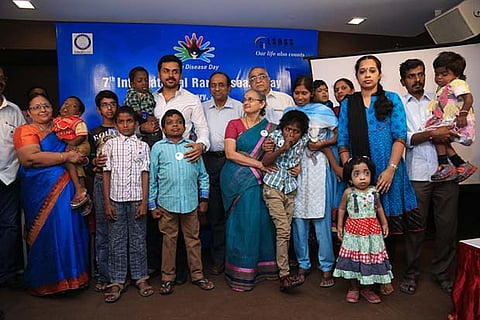

Chennai
However, while a medical board was set up by Institute of Child Health, Egmore, the lack of financial support from the state has made medication and treatment a tough battle.
Lysosomal Storage Disorders (LSD) are a group of around 45 rare, genetic disorders that occur due to the deficiency of specific enzymes in special compartments (lysosomes) of the cells. Symptoms vary from mild to severe, depending on the disorder and variables like age of onset. They can include developmental delay, movement disorders, seizures, dementia, deafness and/or blindness.
M Raja’s 13-year-old son has been under enzyme replacement therapy (ERT) for gaucher’s disease (GD), for the last seven years. He has received assistance from US-based biotech company Genzyme. Characterised by anaemia and enlargement of spleen and liver, GD is one of the 45 rare genetic disorders. Others include Pompe and MPS disorders.
According to The Lysosomal Storage Disorders Support Society, India (LSDSS), there are as many as 150 children (of the 600 registered with the society) from across TN living one of these rare conditions.
Dr Sujatha Jagadeesh, Consultant Geneticist and Dysmorphologist, MediScan, says that the diseases cannot be reversed but can be controlled with early detection and treatment. “But the treatment is expensive, amounting to Rs 2 lakh per month per child. Some organisations like Port Trust, ESI, apart from the Indian Armed Forces have been supporting a few children. But they have to be supported lifelong. In case, more children approach them for assistance what will be their stand,” she says. After a proposal was submitted to the Tamil Nadu Government in 2014, in 2015, a medical board was constituted by ICH, Egmore, and a four-year-old with MPS1 (Hurler Syndrome) was referred for treatment.
But government assistance for treatment remains elusive for these children, casting a shadow of uncertainty over their future. Dr Sujatha adds, “The medical board will recommend the sickest child for treatment, but there are others who will do better with medication. In the absence of help, some of them go for splenectomy, where the spleen is removed and bone marrow transplant is carried out. It is a risky procedure and we lose children in this process.”
Manjit Singh, President of LSDSS, says that the state needs to look into the issue. “State is a health subject and this issue has to be looked into directly by them. We need policies in place to support the children. In the lack of it, we will lose children to the diseases.
Visit news.dtnext.in to explore our interactive epaper!
Download the DT Next app for more exciting features!
Click here for iOS
Click here for Android